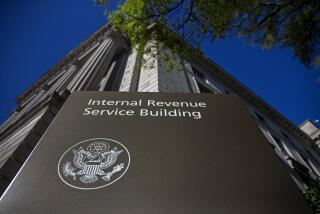A Tax Disgrace
- Share via
Many economists, not all of them conservatives, would like to see the corporate income tax done away with entirely. As they see it, companies pass it on as another cost of doing business, so it is really a consumer tax. And the corporate income tax produces only about 6% of federal revenues these days anyway.
Realistically, however, elimination of the corporate income tax isn’t going to happen. That being the case, tax reform should include provisions for greater tax equity among different kinds of companies. And it should reduce the outrageous opportunities for tax avoidance that corporations in some industries now enjoy.
Under present law the federal tax on corporate profits is supposed to be 46%. Few if any companies pay that much; the average burden is about 16%. And some companies pay much, much more than others because of the uneven effect of various tax credits, deductions and deferrals.
For example, the country’s biggest defense contractors typically pay no corporate income tax at all. Neither do companies in the chemical industry. In 1982 banks and railroads paid an average of about 4% of earnings in federal income taxes. The broadcasting, beverage and insurance industries also are on the low end of the taxation scale.
At the same time, trucking companies in 1982 paid 37% of earnings. For firms in the tobacco, soap and cosmetic industries the average figure was around 36%. Smaller corporations make out less well than big ones; companies with profits ranging from $100,000 to $1 million a year pay effective tax rates of more than 40%.
There are various explanations. In general, industries with high effective tax rates are those with light capital investment needs but large manpower costs. At the low end of the scale, large foreign tax credits help account for the chemical industry’s large-scale avoidance of taxes.
General Electric, which paid no corporate income tax in some recent years, takes advantage of a law that allows one company to buy tax benefits from another that, for one reason or another, can’t use them.
General Dynamics, whose earnings since 1972 have totaled hundreds of millions of dollars, has not paid a dollar of corporate income tax in that period, and, according to congressional investigators, stands to pay none for years to come. The big reason is a law allowing defense contractors to defer taxes on earnings until a contract is completed. A law enacted in 1982 reduced the favorable treatment, but didn’t remove it.
Support is building in Congress for a minimum tax, 15% in one version and 25% in another, on both corporations and individuals earning more than $100,000 a year. The projected take for the Treasury would be as much as $15 billion.
A minimum tax should not be seen as a substitute for more sweeping tax reform, as some congressional opponents of broad reform prefer to think. Moreover, tax reform itself is a complicated business. Most so-called loopholes were originally enacted in good-faith efforts to encourage investment in job-creating equipment or to achieve other worthwhile goals. A reform-minded Congress must look before it leaps.
Whether through the minimum tax or some other mechanism, however, Congress must act to end a disgraceful situation that allows many companies making millions of dollars to get away with paying zero dollars in federal income tax--not just once, but year after year.
More to Read
Inside the business of entertainment
The Wide Shot brings you news, analysis and insights on everything from streaming wars to production — and what it all means for the future.
You may occasionally receive promotional content from the Los Angeles Times.










